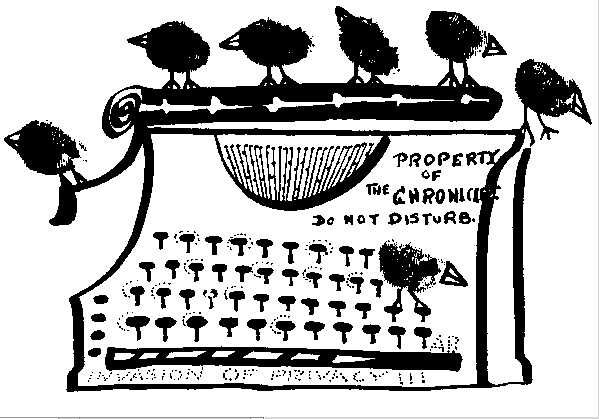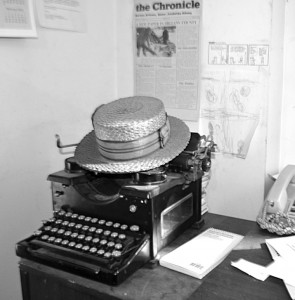

copyright the Chronicle February 4, 2015
by Chris Braithwaite
To me the Chronicle will always be a novelty — a shot in the dark, a crazy gamble undertaken with almost no money but all the energy a 30-year-old immigrant could summon in himself, his wife, and a handful of friends.
But more than half the people living in Orleans County today had a Chronicle to read when they were old enough to read anything. And when my mind wanders up and down the streets of Barton Village, I can’t find a business that has been around, under continuous ownership, any longer than the Chronicle.
Those are hardly the trappings of a novelty. And at 70, I am a long way from the youngster who set out to see if small-town weekly journalism could be as complex, as challenging, as rewarding as the big-city journalism he’d left behind four years before.
After four decades I can report the result of that experiment. The stories I’ve encountered have been every bit as complex, and just as “good” — in the hard-eyed way that reporters evaluate their raw material — as the stories any reporter covers, anywhere.
Writing them has been more difficult here than in Toronto or Los Angeles, however, because I’ve been writing about friends, neighbors, people I know I will encounter again and again in all kinds of situations (I seem to be stuck in the ditch, do you have a tow chain?). The subjects of the small-town journalist are warm-blooded people, not anonymous grist for the mill of the printing press.
To those who feel they’ve been treated without such respect in the pages of the Chronicle, this is my last chance to apologize, and I do.
My experiment in weekly, small-town journalism faced another complication in 1974. I had already chosen my town (or towns, if you will). But there was no weekly to which I could offer my services.
Thus began a secondary experiment, in small-scale capitalism.
As experiments go, journalism gave me a fair chance of success. I’d fallen in love with the craft as soon as I stumbled into it in 1964, the way you might fall in love with a woman you see across a crowded, smoky room at a party.
But capitalism promised only catastrophe. By nature and education, I was deeply suspicious of the way business is conducted by large corporations. Yet I had to start one of my own, and keep the doors open, the bills paid.
I have a bit of a hang-up with authority, a personal flaw that had a lot to do with my leaving big-city journalism and coming to Vermont in the first place. But I would have to hire (and inevitably fire) people, and tell them what to do.
This contradiction worked out better than I had any reason to expect. Since I hated telling people what to do, I tended to hire people who knew exactly what to do. That is to say hard-working self-starters who loved their jobs and did them best if they were left the hell alone.
It turned out there are plenty of such people in the area — enough, certainly, to staff a small-town weekly paper. And since their idea of the appropriate level of job supervision — essentially zero — corresponded to mine, we all got along pretty well.
Since I started out doing almost everything myself, I developed a simple principle: The person I hired to take over any job at the paper should do it better than I had been doing it. Given my lack of business experience and how thinly I was spread in the Chronicle’s early years, that wasn’t asking a lot.
I don’t know if such a free-wheeling personnel policy would work for everybody, but I do know this: When the time came to separate myself from the newspaper and begin looking around for potential buyers, they turned out to be the people I’ve been working with for years.
Their qualifications were obvious. They knew how to run the newspaper, because they’d been doing it so well, and so independently, for so long. They loved the paper, or why else would they have stuck with it so long for so little material reward?
Then it was just a matter of finding an appropriate, capitalist way to make the transition. Our new board member, David Royer of Orleans, came up with that formula.
And on Friday, January 30, a very cheerful group of two sellers and ten buyers met at the Chronicle’s editorial room on Water Street in Barton, signed a lot of papers provided by Robert Chimileski, Esq., and the deal was done.
Profound thanks are due to the second seller, my ex-wife and founding partner, Ellen Braithwaite. We divorced in 1994, and at that point the small business that was the Chronicle, Inc., should have gone the way of all husband-and-wife partnerships in that circumstance. We should have had to sell the Chronicle to divide the assets.
But Ellen was willing to hang in as a pretty-much silent and scantly rewarded partner, offering what guidance she could from her new home on the West Coast. Those 20 years of trust and patience enabled the Chronicle to get to the point it reached last Friday.
Thanks are also due to Ed Cowan, a friend and fellow journalist (from The New York Times, no less) who inspired the experiment and put up the initial $5,000 that got the paper started. He left the partnership in the fall of 1974, but has remained a good friend, constant reader, and when necessary, constructive critic.
But the most important people in this story are those who have committed themselves to carrying the paper forward: Tracy Davis Pierce of Barton, its publisher; Tena Starr of Glover, its editor; assistant editor Natalie Hormilla of West Glover; reporters Paul Lefebvre of Newark and Joseph Gresser of Stannard; mail room manager Trudy Blackburn of Glover; circulation manager Georgia Young of Glover; deliveryman Billy Thompson of Charleston; and ad representatives Kjya Detoma of Charleston and Zack Lafont of Barton.
If, as Tena has suggested, they feel like the Fellowship of the Ring, then I must be Bilbo Baggins, wandering off to Heaven knows where after a truly fine adventure.
For more free articles from the Chronicle like this one, see our Editor’s Picks pages. For all the Chronicle’s stories, subscribe:
Print subscription
Annual online subscription
Short-term online subscription







